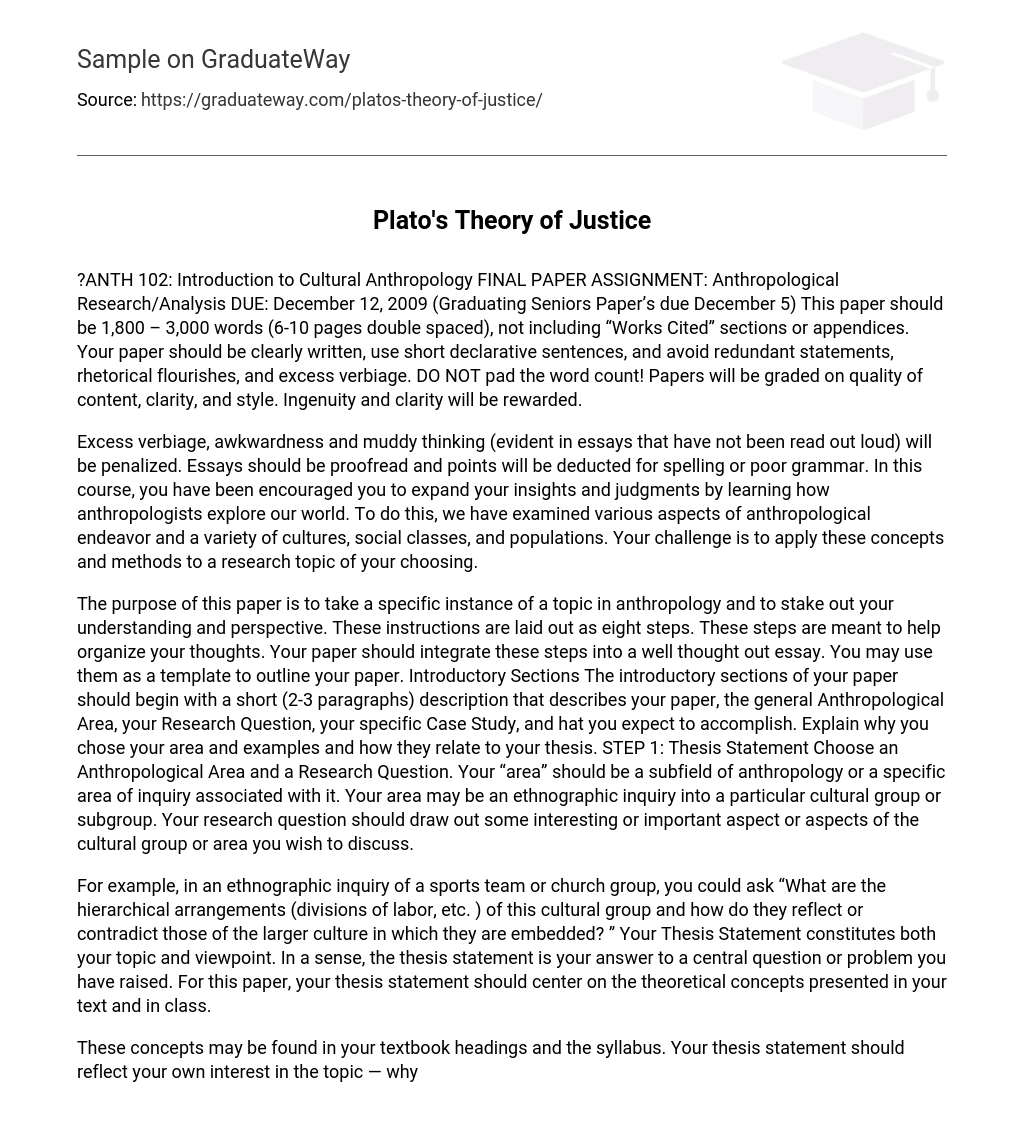Excess verbiage, awkwardness and muddy thinking (evident in essays that have not been read out loud) will be penalized. Essays should be proofread and points will be deducted for spelling or poor grammar. In this course, you have been encouraged you to expand your insights and judgments by learning how anthropologists explore our world. To do this, we have examined various aspects of anthropological endeavor and a variety of cultures, social classes, and populations. Your challenge is to apply these concepts and methods to a research topic of your choosing.
The purpose of this paper is to take a specific instance of a topic in anthropology and to stake out your understanding and perspective. These instructions are laid out as eight steps. These steps are meant to help organize your thoughts. Your paper should integrate these steps into a well thought out essay. You may use them as a template to outline your paper. Introductory Sections The introductory sections of your paper should begin with a short ) description that describes your paper, the general Anthropological Area, your Research Question, your specific Case Study, and hat you expect to accomplish. Explain why you chose your area and examples and how they relate to your thesis.
STEP 1: Thesis Statement
Choose an Anthropological Area and a Research Question. Your “area” should be a subfield of anthropology or a specific area of inquiry associated with it. Your area may be an ethnographic inquiry into a particular cultural group or subgroup. Your research question should draw out some interesting or important aspect or aspects of the cultural group or area you wish to discuss.
For example, in an ethnographic inquiry of a sports team or church group, you could ask “What are the hierarchical arrangements (divisions of labor, etc. ) of this cultural group and how do they reflect or contradict those of the larger culture in which they are embedded? ” Your Thesis Statement constitutes both your topic and viewpoint. In a sense, the thesis statement is your answer to a central question or problem you have raised. For this paper, your thesis statement should center on the theoretical concepts presented in your text and in class. These concepts may be found in your textbook headings and the syllabus. Your thesis statement should reflect your own interest in the topic — why did you chose it?
STEP 2: Methodology
Choose examples or a case study that reflects the group or area you choose to study (e. g. , an idea like “peasants in the United States,” or a cultural group like a specific church community or sports team). This will be the specific focus of your writing. Your methodology section consists of a statement of your specific examples or case study, why you chose it/them, and the “toolkit” you will use and why. Main Sections The main body of your paper should elaborate on and support the material you exposed in the introductory sections.
STEP 3: Background
For Step 3, you will do background research on the culture you wish to write about. For the purposes of this paper, your background research should consist of a description of the cultural group your case study is derived from including demography and current anthropological theories drawn from relevant literature. Your references should be drawn primarily from appropriate academic journals and books. Internet sources (Wikipedia, etc. are not acceptable — you can use the internet as a starting point, but your citations and references must me drawn from books and journals!
STEP 4: Analysis/Ethnography
Describe the social structure and other relevant features of your group’s internal workings. You will analyze your specific example according to the appropriate toolbox (this can be derived from your text). group. For example, your set of tools you might include groupings or divisions of labor by gender, age, common interest, and class (see text Chapter 11). Each of these divisions can be seen as a tool under a separate heading.
STEP 5: Larger Context/Ethnology
Place your social group in a larger context. Compare your findings from Step 4 with your cultural group’s larger (i. e. , national, global, or other) context. How does your group interact with the larger society in which it is embedded? What is the function(s) of this group in a larger context (see Malinowski)?
STEP 6: Limitations of Current Research
What are the limits of your research and analysis? What was not possible to explore and what did you miss? What are the limits of this method?
STEP 7: Conclusion
In a short and concise section, sum up your observations and findings. What did you learn? Were there any surprises? Where should you go from here?
STEP 8: References/Works Cited
You must refer to at least FIVE SOURCES in your paper. TWO of them MUST come from your textbook and at least ONE MUST come from another academic text, either a journal article or book. It is appropriate to cite sidebars from the text including “Original Studies,” “Anthropologists of Note,” “Biocultural Connections,” etc. Failure to make appropriate and relevant reference to five readings (or fieldwork, see below) will be penalized.
These references must support your specific culture’s background information as well as your theoretical perspective. Cite your chosen readings clearly in both the body of your text, as well as in a “Works Cited” or “Bibliography” section at the end of your paper. Follow the writing guidelines carefully—these will be strictly enforced. You may support your paper with actual fieldwork — participant-observation at church or a sporting event or a performance that correlates to the cultural area you have chosen are acceptable. In order to qualify as a reference, you must state the date and place of the events that you witnessed.





